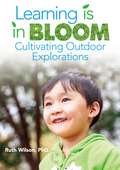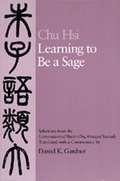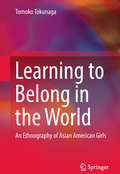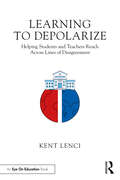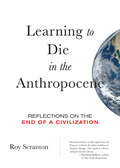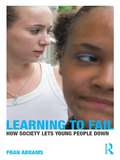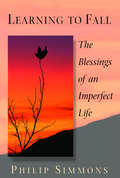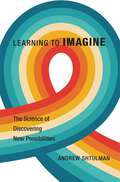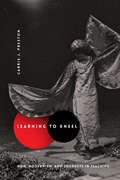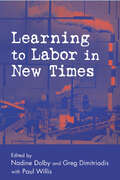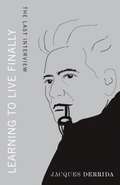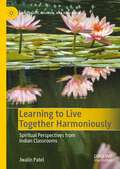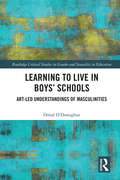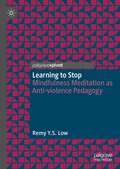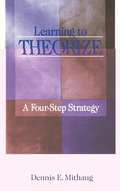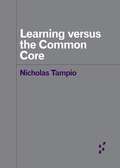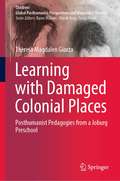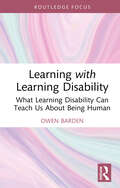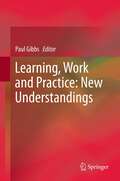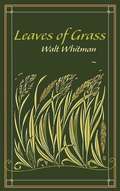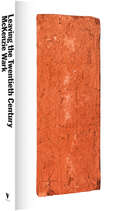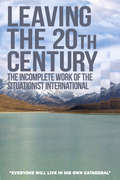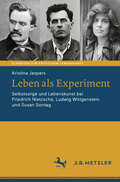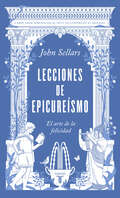- Table View
- List View
Learning is in Bloom: Cultivating Outdoor Explorations
by Ruth Wilson Gwendolyn Johnson Susan GuiterasThe movement to connect young children with nature continues to grow, as more parents and educators become passionate about bringing learning outdoors and letting children explore outside the bounds of traditional lessons. In the full-color Learning Is in Bloom, teachers and caregivers will find 40 hands-on activities effective in engaging young children in investigating nature, both indoors and outdoors, on the school grounds, and on excursions around the neighborhood. Through fostering a love of nature, the activities promote all areas of early childhood education and development.
Learning to Be a Sage: Selections from the Conversations of Master Chu, Arranged Topically
by Hsi Chu Daniel K. GardnerDaniel Gardner's translation of the teachings of Chu Hsi (1130-1200)--a luminary of the Confucian tradition who dominated Chinese intellectual life for centuries focuses on Chu Hsi's passionate interest in education and its importance to individual development.
Learning to Belong in the World: An Ethnography Of Asian American Girls
by Tomoko TokunagaThis book provides a complex and intricate portrayal of Asian American high school girls – which has been an under-researched population – as cultural meditators, diasporic agents, and community builders who negotiate displacement and attachment in challenging worlds of the in-between. Based on two years of ethnographic fieldwork, Tomoko Tokunaga presents a portrait of the girls’ hardships, dilemmas, and dreams while growing up in an interconnected world. This book contributes a new understanding of the roles of immigrant children and youth as agents of globalization and sophisticated border-crossers who have the power and agency to construct belonging and identity across multiple contexts, spaces, times, activities, and relationships. It has much to offer to the construction of educative communities and spaces where immigrant youth, specifically immigrant girls, can thrive.
Learning to Depolarize: Helping Students and Teachers Reach Across Lines of Disagreement
by Kent LenciHow can schools shoulder some responsibility for depolarizing our fractured American society? In this provocative new book, Kent Lenci describes how educators can tackle the challenge of preparing students to communicate and collaborate across lines of deep disagreement—to face the political and ideological "other"—despite the conventional wisdom that schools should be apolitical. Topics covered include the causes and consequences of political polarization in our society, why schools must address the challenge head-on, bridge-building in the classroom, media literacy and social emotional learning as tools for depolarization, and partnering with parents across the divide. Each chapter offers current research as well as practical strategies and classroom anecdotes. Appropriate for teachers of all grade levels and subject areas, the book will help you reconsider your classroom and school’s role in forging a more depolarized future.
Learning to Die in the Anthropocene
by Roy Scranton"In Learning to Die in the Anthropocene, Roy Scranton draws on his experiences in Iraq to confront the grim realities of climate change. The result is a fierce and provocative book."--Elizabeth Kolbert, Pulitzer Prize-winning author of The Sixth Extinction: An Unnatural History"Roy Scranton lucidly articulates the depth of the climate crisis with an honesty that is all too rare, then calls for a reimagined humanism that will help us meet our stormy future with as much decency as we can muster. While I don't share his conclusions about the potential for social movements to drive ambitious mitigation, this is a wise and important challenge from an elegant writer and original thinker. A critical intervention."--Naomi Klein, author of This Changes Everything: Capitalism vs. the Climate Coming home from the war in Iraq, US Army private Roy Scranton thought he'd left the world of strife behind. Then he watched as new calamities struck America, heralding a threat far more dangerous than ISIS or Al Qaeda: Hurricane Katrina, Superstorm Sandy, megadrought--the shock and awe of global warming.Our world is changing. Rising seas, spiking temperatures, and extreme weather imperil global infrastructure, crops, and water supplies. Conflict, famine, plagues, and riots menace from every quarter. From war-stricken Baghdad to the melting Arctic, human-caused climate change poses a danger not only to political and economic stability, but to civilization itself . . . and to what it means to be human. Our greatest enemy, it turns out, is ourselves. The warmer, wetter, more chaotic world we now live in--the Anthropocene--demands a radical new vision of human life.In this bracing response to climate change, Roy Scranton combines memoir, reportage, philosophy, and Zen wisdom to explore what it means to be human in a rapidly evolving world, taking readers on a journey through street protests, the latest findings of earth scientists, a historic UN summit, millennia of geological history, and the persistent vitality of ancient literature. Expanding on his influential New York Times essay (the #1 most-emailed article the day it appeared, and selected for Best American Science and Nature Writing 2014), Scranton responds to the existential problem of global warming by arguing that in order to survive, we must come to terms with our mortality.Plato argued that to philosophize is to learn to die. If that's true, says Scranton, then we have entered humanity's most philosophical age--for this is precisely the problem of the Anthropocene. The trouble now is that we must learn to die not as individuals, but as a civilization.A war veteran, journalist, author, and Princeton PhD candidate, Roy Scranton has published in the New York Times, Wall Street Journal, Rolling Stone, Boston Review, and Theory and Event, and has been interviewed on NPR's Fresh Air, among other media.imes. This compressed, essential text offers both uncomfortable truths and unexpected joy."--McKenzie Wark, author of Molecular Red: Theory for the Anthropocene
Learning to Fail: How Society Lets Young People Down
by Fran AbramsDuring a decade of relative prosperity from the mid-1990s onward, governments across the developed world failed to crack one major issue – youth unemployment. Even when economic growth was strong, one young person in 10 in the United Kingdom was neither working nor learning. As the boom ended, the number of young people dropping out after leaving school – already acknowledged to be too high - began to rise at an alarming rate. As governments face up to the prospect of a new generation on the dole, this book examines the root causes of the problem. By holding a light to the lives and attitudes of eight young people, their families, their teachers and their potential employers, this book will challenge much of what has been said about educational success and failure in the past 20 years. For two decades, policy makers largely assumed schools were the key to ensuring young people got the best possible start in life. Yet for many children the path to failure began well before their first day at school. Through the stories of these young people, this book reveals how marginalised young people are let down on every step of their journey. Growing up in areas where aspiration has died or barely ever existed, with parents who struggle to guide them on life in the 21st century, they are let down by schools where teachers underestimate them, by colleges and careers advisers who mislead them and by an employment market which has forgotten how to care or to nurture. Learning to Fail goes behind the headlines about anti-social behaviour, drugs and teenage pregnancy to paint a picture of real lives and how they are affected by outside forces. It gives a voice to ordinary parents and youngsters so they can speak for themselves about what Britain needs to do to turn its teenage failures into a success story.
Learning to Fall: The Blessings of an Imperfect Life
by Philip SimmonsA &“reflective, eloquent [and] inspiringly written&” (The New York Times) collection of essays about learning to live richly in the face of loss &“Astonishing . . . sometimes heartbreaking . . . sometimes hilarious.&”—The Boston Globe WINNER OF THE BOOKS FOR A BETTER LIFE AWARD&’S BEST SPIRITUAL BOOKPhilip Simmons was just thirty-five years old in 1993 when he learned that he had ALS, or Lou Gehrig&’s disease, and was told he had less than five years to live. As a young husband and father, and at the start of a promising literary career, he suddenly had to learn the art of dying. Nine years later, he succeeded, against the odds, in learning the art of living. In this surprisingly joyous and spirit-renewing book, he chronicles his search for peace and his deepening relationship with the mystery of everyday life. From our first faltering steps, Simmons says, we may fall into disappointment or grief, fall into or out of love, fall from youth or health. And though we have little choice as to the timing or means of our descent, we may, as he affirms, &“fall with grace, to grace.&”With humor, hard-earned wisdom, and a keen eye for life&’s lessons—whether drawn from great poetry or visits to the town dump—Simmons shares his discovery that even at times of great sorrow we may find profound freedom. And by sharing the wonder of his daily life, he offers us the gift of connecting more deeply and joyously with our own.
Learning to Imagine: The Science Of Discovering New Possibilities
by Andrew ShtulmanAn award-winning cognitive scientist offers a counterintuitive guide to cultivating imagination.Imagination is commonly thought to be the special province of youth—the natural companion of free play and the unrestrained vistas of childhood. Then come the deadening routines and stifling regimentation of the adult world, dulling our imaginative powers. In fact, Andrew Shtulman argues, the opposite is true. Imagination is not something we inherit at birth, nor does it diminish with age. Instead, imagination grows as we do, through education and reflection.The science of cognitive development shows that young children are wired to be imitators. When confronted with novel challenges, they struggle to think outside the box, and their creativity is rigidly constrained by what they deem probable, typical, or normal. Of course, children love to “play pretend,” but they are far more likely to simulate real life than to invent fantasy worlds of their own. And they generally prefer the mundane and the tried-and-true to the fanciful or the whimsical.Children’s imaginations are not yet fully formed because they necessarily lack knowledge, and it is precisely knowledge of what is real that provides a foundation for contemplating what might be possible. The more we know, the farther our imaginations can roam. As Learning to Imagine demonstrates, the key to expanding the imagination is not forgetting what you know but learning something new. By building upon the examples of creative minds across diverse fields, from mathematics to religion, we can consciously develop our capacities for innovation and imagination at any age.
Learning to Kneel: Noh, Modernism, and Journeys in Teaching (Modernist Latitudes)
by Carrie J. PrestonIn this inventive mix of criticism, scholarship, and personal reflection, Carrie J. Preston explores the nature of cross-cultural teaching, learning, and performance. Throughout the twentieth century, Japanese noh was a major creative catalyst for American and European writers, dancers, and composers. The noh theater’s stylized choreography, poetic chant, spectacular costumes and masks, and engagement with history inspired Western artists as they reimagined new approaches to tradition and form. In Learning to Kneel, Preston locates noh’s important influence on such canonical figures as Pound, Yeats, Brecht, Britten, and Beckett. These writers learned about noh from an international cast of collaborators, and Preston traces the ways in which Japanese and Western artists influenced one another.Preston’s critical work was profoundly shaped by her own training in noh performance technique under a professional actor in Tokyo, who taught her to kneel, bow, chant, and submit to the teachings of a conservative tradition. This encounter challenged Preston’s assumptions about effective teaching, particularly her inclinations to emphasize Western ideas of innovation and subversion and to overlook the complex ranges of agency experienced by teachers and students. It also inspired new perspectives regarding the generative relationship between Western writers and Japanese performers. Pound, Yeats, Brecht, and others are often criticized for their orientalist tendencies and misappropriation of noh, but Preston’s analysis and her journey reflect a more nuanced understanding of cultural exchange.
Learning to Kneel: Noh, Modernism, and Journeys in Teaching (Modernist Latitudes)
by Carrie J. PrestonIn this inventive mix of criticism, scholarship, and personal reflection, Carrie J. Preston explores the nature of cross-cultural teaching, learning, and performance. Throughout the twentieth century, Japanese noh was a major creative catalyst for American and European writers, dancers, and composers. The noh theater's stylized choreography, poetic chant, spectacular costumes and masks, and engagement with history inspired Western artists as they reimagined new approaches to tradition and form. In Learning to Kneel, Preston locates noh's important influence on such canonical figures as Pound, Yeats, Brecht, Britten, and Beckett. These writers learned about noh from an international cast of collaborators, and Preston traces the ways in which Japanese and Western artists influenced one another. Preston's critical work was profoundly shaped by her own training in noh performance technique under a professional actor in Tokyo, who taught her to kneel, bow, chant, and submit to the teachings of a conservative tradition. This encounter challenged Preston's assumptions about effective teaching, particularly her inclinations to emphasize Western ideas of innovation and subversion and to overlook the complex ranges of agency experienced by teachers and students. It also inspired new perspectives regarding the generative relationship between Western writers and Japanese performers. Pound, Yeats, Brecht, and others are often criticized for their orientalist tendencies and misappropriation of noh, but Preston's analysis and her journey reflect a more nuanced understanding of cultural exchange.
Learning to Labor in New Times (Critical Social Thought)
by Paul Willis Nadine Dolby Greg DimitriadisLearning to Labor in New Times foregrounds nine essays which re-examine the work of noted sociologist Paul Willis, 25 years after the publication of his seminal Learning to Labor, one of the most frequently cited and assigned texts in the cultural studies and social foundations of education.
Learning to Live Finally: The Last Interview
by Jacques Derrida Jean Birnbaum Pascal-Anne BraultWith death looming, Jacques Derrida, the world's most famous philosopher--known as the father of "deconstruction"--sat down with journalist Jean Birnbaum of the French daily Le Monde. They revisited his life's work and his impending death in a long, surprisingly accessible, and moving final interview. Sometimes called "obscure" and branded "abstruse" by his critics, the Derrida found in this book is open and engaging, reflecting on a long career challenging important tenets of European philosophy from Plato to Marx. The contemporary meaning of Derrida's work is also examined, including a discussion of his many political activities. But, as Derrida says, "To philosophize is to learn to die"; as such, this philosophical discussion turns to the realities of his imminent death--including life with a fatal cancer. In the end, this interview remains a touching final look at a long and distinguished career.
Learning to Live Together Harmoniously: Spiritual Perspectives from Indian Classrooms (Spirituality, Religion, and Education)
by Jwalin PatelThis book calls for an expanded vision of holistic education that emphasizes togetherness and harmony through the discovery of oneself, others, and the larger society. It brings together teachers’ voices, experiences, and practices for such an education with Southern Knowledge, philosophy and ideologies proposed by Indian philosophers and spiritual leaders like Aurobindo, the Dalai Lama, Gandhi, Krishnamurti, and Tagore. The book reconceptualizes and extends UNESCO's "Learning To Live Together" to emphasize "Learning to Live Together Harmoniously" (LTLTH) and develops a novel conceptual framework for it. The book also explores how LTLTH can be translated into practice; calling for a continuum of harmonious lived experiences created through experiential and project based pedagogy, systems and processes for autonomy and autonomous behaviour regulation, empathetic teacher student relations, schoolwide ethos of harmonious living, and teachers’ ways of living and being.
Learning to Live in Boys’ Schools: Art-led Understandings of Masculinities (Routledge Critical Studies in Gender and Sexuality in Education)
by Donal O'DonoghueThis book is about boys’ experiences of being educated in independent single-sex schools in Canada. These experiences, which are oftentimes attributed to particular places and moments at school, reveal ways in which school places are both "companionable" and "influential" in how boys become available to themselves and others as they pursue the possibility of becoming somebody. Curious about how masculinities show up in places at school and studying the sorts of gendered subjectivities that such places invite, entice, support and deny, the book extends beyond traditional ways of thinking and writing about the production of masculinities in education by introducing a different set of conceptual orientations and inquiry practices, including post-masculinities, weak theory, and art-led research and thought practices.
Learning to Stop: Mindfulness Meditation as Anti-violence Pedagogy
by Remy Y.S. LowThis book is a philosophical and historical study that explores how meditative practices for cultivating mindfulness can be regarded as a unique form of education against violence—one that emphasizes stopping and contemplation as a necessary precursor to action. It brings together the idiosyncratic but insightful musings on violence by Slovenian philosopher Slavoj Žižek with recent research on mindfulness and violence as a lens. Using this lens, it looks at two exemplary educators and how they taught mindfulness meditation as a way of resisting the types of violence they and their students faced: the Vietnamese Zen teacher Thich Nhat Hanh amidst the brutality of the Second Indochina War (1955-1975), and the African-American studies professor and cultural critic bell hooks in the face of systemic oppression in the United States of the 1980s.
Learning to Theorize: A Four-Step Strategy
by Dennis E. Mithaughow to separate the facts, value and actions of a situation to clarify and understand their relationship and how a thinking strategy assists in learning to theorize better
Learning versus the Common Core (Forerunners: Ideas First #55)
by Nicholas TampioAn open challenge to Common Core&’s drive for uniformity Nicholas Tampio watched as his kindergartner&’s class shifted from one where teachers, aides, parents, and students worked hard to create a rewarding educational experience to one in which teachers delivered hours-long lectures using packaged lesson plans. Learning versus the Common Core explains how standards-based education reform is transforming nearly every aspect of public education by looking closely at the standards, the agenda of people pushing standards-based reform, and how these fit within a global pattern of education reform. With a nod to the philosophy of John Dewey, Tampio concludes with a vision of what democratic education can look like today—and how people can form rhizomatic alliances across different political and ethical backgrounds to fight the Common Core.Forerunners: Ideas First Short books of thought-in-process scholarship, where intense analysis, questioning, and speculation take the lead
Learning with Damaged Colonial Places: Posthumanist Pedagogies from a Joburg Preschool (Children: Global Posthumanist Perspectives and Materialist Theories)
by Theresa Magdalen GiorzaThis book offers a close and detailed account of the emergent and creative pedagogies of children learning together in a small, not-for-profit preschool, and the entangled becomings of their carers as well as the researcher–artist–author. The mutually affecting and inseparable realities of the ‘material’ and the ‘discursive’ are made visible through lively and sensual pedagogical invention by a group of five-year olds in the inner-city preschool which is located in Johannesburg, South Africa. These small, local stories are recognized in their emergence with global geopolitical realities. The author makes a valuable contribution to post-qualitative research through the use of visual research methods and non-representational approaches to working with knowledge. The book draws on the constantly evolving practices of Philosophy for Children (P4C) and Reggio Emilia both as pedagogical tools and as research methods. Photographs and stills from video footage provide a sense of the relatively modest material environment of the school. The book celebrates the considerable richness of the involvement of the children and the enormous possibilities offered by the world both inside and outside of the classroom when an enquiry-led art-based pedagogy is followed. Drawings and other products created by the children in the study offer valuable insight into the depth and complexity of their engagement with their worlds, both individual and collaborative.
Learning with Learning Disability: What Learning Disability Can Teach Us About Being Human (Autocritical Disability Studies)
by Owen BardenThis book uses the concept of “learning disability” to explore what it means to be human. It argues that we need to learn with rather than from or about learning disability. This crucial distinction means being open to what learning disability can teach us about what it means to be human. This approach comes from recognising learning disability as an organising concept – a concept which radically transforms our sense of what it means to be – or not be – a person.After reflecting on the author’s relationship to learning disability, the book explores relationships and tensions between conceptualisations of learning disability and of the human. Through historical ontology, the book initially examines how the phenomenon of “learning disability” came into being. It then explores ways in which the concept of learning disability has, over the course of the 20th and 21st centuries, radically transformed our sense not only of education and learning, but also of who is or is not deemed entitled to full citizenship and the associated rights, and so who is or is not fully human. Each chapter of the book exposes tensions and contradictions apparent in the ways we tend to think about personhood and learning disability, illuminating them through a series a binary oppositions: human and not fully human; menacing and vulnerable; controlled and abandoned; capable and incapable; human and posthuman.The book concludes by drawing together these tensions and contradictions to challenge the prevailing metanarrative of disability and make the case for a more inclusive conceptualisation of what it means to be human.It will be of interest to all scholars and students of disability studies, the history of learning disability, humanism and posthumanism, and learning disability advocacy.
Learning, Work and Practice: New Understandings
by Paul GibbsThis book's original contribution to a crowded literature on work and learning will attract strong international interest. Its focus on the philosophy of learning at work brings a fresh perspective on a topic normally viewed through psychological, anthropological and sociological eyes. It assembles a host of internationally recognized scholars who reflect on the various philosophies of work-based learning. Full of distinctive and original contributions that provide perceptive insights into the subject, the work will be a practical support to teachers, trainers and researchers at the same time as it gives readers a clear philosophical grounding in learning at work. It is, however, not simply a book about philosophy, but a gazetteer of approaches to education in work that will sustain and inspire those who provide, engage in, and support the learning of new knowledge and skills in the workplace. With adaptability to new employment opportunities so vital to existing workers, the authors stand behind continued provision of work-based learning in the face of tightening economic constraints.
Leaves of Grass: The Original 1855 Edition (Leather-bound Classics #Vol. No. 9)
by Walt Whitman Kenneth C. MondscheinA timeless collection of hundreds of poems that resonate to the American spirit. Leaves of Grass is a timeless collection of poems and essays penned by influential nineteenth-century writer Walt Whitman. This profound compilation explores topics such as nature, mysticism, mortality, transcendentalism, and democracy. Inspired by personal experiences and observations, Whitman spent almost four decades piecing together the complete work, sharing societal ideals and epiphanies about life that still resonate with readers today. This edition of the complete Leaves of Grass also includes Whitman’s preface to the original 1855 edition, in which he expounds on his personal philosophy of writing poetry, and an introduction by scholar Kenneth C. Mondschein.
Leaving The Twentieth Century: Situationist Revolutions
by McKenzie WarkThe acclaimed history of the groundbreaking Situationist movementThe Situationist International, which leaped to the fore during the Paris tumult of 1968, has extended its revolutionary influence right up to the present day. In Leaving the Twentieth Century, the movement is captured for the first time in its full range and diversity.McKenzie Wark traces the group&’s development from the bohemian Paris of the &’50s to the explosive days of May &’68. She introduces the group as an ensemble, revealing the work and activities of thinkers previously obscured by the reputation of founding member Guy Debord. Roaming through Europe and exploring the vital lives its members—including Constant, Asger Jorn, Michèle Bernstein, Alexander Trocchi, and Jacqueline de Jong—Wark uncovers a group riven with conflicting passions. She follows the narrative beyond 1968, to the Situationists International&’s disintegration and beyond: the ideas of T. J. Clark, the Fourierist utopia of Raoul Vaneigem, René Vienet&’s earthy situationist cinema, Gianfranco Sanguinetti&’s pranking of the Italian ruling class, Alice Becker-Ho&’s account of the anonymous language of the Romany, and Debord&’s late films and his surprising work as a game designer.
Leaving the 20th Century: The Incomplete Work of the Situationist International
by Christopher GrayThe first Situationist text to be published in the UK in 1974, 'Leaving the 20th Century' was Chris Gray and the English situationists' attempt to capture and distil the vibrant anti-art, anti-capitalist energy of the original International Situationist texts (1957-74). With its loose translations and irreverent commentary, Gray and co. attempted to capture the "terrorism, wit and general megalomania" of the original publications, whilst faithfully reprinting the "photographs of girls, soldiers, bombings, comic-strip frames, maps of cities and diagrams of labyrinths, cathedrals and gardens." From the art/anti-art beginnings, to the role of the Situationists in the worker-student insurrection of May 68', 'Leaving the 20th Century' remains the definitive English pro-situ text.
Leben als Experiment: Selbstsorge und Lebenskunst bei Friedrich Nietzsche, Ludwig Wittgenstein und Susan Sontag (Schriften zur Kritischen Lebenskunst)
by Kristina JaspersFriedrich Nietzsche, Ludwig Wittgenstein und Susan Sontag beschäftigten sich intensiv mit Fragen der Selbstsorge und Lebenskunst – teils im direkten Bezug aufeinander. So sah Wittgenstein in Nietzsche ein Vorbild in Fragen der Stilistik und Introspektion; Sontag wollte Wittgenstein in der Konsequenz seiner Lebensentscheidungen folgen und Nietzsche in seinem Selbstbewusstsein sowie in seiner radikalen Selbstkritik. Diese Arbeit untersucht drei Experimentierfelder, auf denen Nietzsche, Wittgenstein und Sontag sich erprobt haben und macht diese für heute fruchtbar: Ortswechsel dienen der Veränderung des äußeren Umfelds, der Suche nach neuen Anregungen oder dem Rückzug in eine ihnen gemäße Umgebung. Die Beschäftigung mit Gesundheit und Krankheit betrifft ihre psychische wie physische Verfasstheit und schließt mentale Übungen ein. In der künstlerischen Praxis suchen alle drei neue Erfahrungen, ein anderes Selbsterleben sowie Ausdrucksmöglichkeiten jenseits der Sprache.
Lecciones de epicureísmo: El arte de la felicidad
by John SellarsFilosofía antigua y mediterránea para la vida moderna. Un antídoto epicúreo para la ansiedad. ¿Cómo vivir una vida feliz? Hace más de dos mil años, el filósofo griego Epicuro ofreció una respuesta simple: lo único que realmente necesitamos es placer. Hoy tendemos a asociar la palabra «epicúreo» con el exceso indulgente y el simple disfrute de la comida y el vino, pero el hedonismo ligero y la autocomplacencia decadente están a años luz de la vida placentera que perseguían Epicuro y sus seguidores, más preocupados por los placeres mentales y por eludir el dolor incluso en los tiempos difíciles. Su objetivo, en definitiva, era una existencia de tranquilidad y satisfacción. En este libro elegante y original John Sellars nos lleva a través de la historia del epicureísmo, desde un jardín privado en las afueras de la antigua Atenas, donde Epicuro y sus estudiantes vivieron en el siglo IV a. C. y lasmujeres eran tan bienvenidas como los hombres, hasta Roma, donde la influencia epicúrea floreció gracias al poeta Lucrecio y su cohorte. Sellars propone una manera constructiva de repensar nuestro lugar en el mundo, y nos muestra cómo esta doctrina puede ayudarnos a valorar la importancia de la alegría, la naturaleza y el simple hecho estar vivos. Reseñas: «No solo una excelente introducción a la historia de la filosofía epicúrea, sino también una guía útil para afrontar las múltiples ansiedades de la vida moderna.» The Idler «Lúcido y repleto de sabiduría.» The Daily Telegraph «Sellars expone con pericia las ideas epicúreas, en particular sobre la amistad y el dolor, y está íntimamente familiarizado con los textos epicúreos griegos y latinos. El epicureísmo puede aliviar las preocupaciones contemporáneas, defiende Sellars. Se parece a la terapia cognitivo-conductual.» The Guardian «En este libro breve y elocuente, John Sellars nos lleva a través de los argumentos básicos del epicureísmo con una claridad maravillosa, destilando la esencia de una filosofía antigua que habla con creciente urgencia de nuestros tiempos convulsos. Es una guía ejemplar y la recomiendo con entusiasmo a lectores de todas las edades y condiciones sociales.» DAVID KONSTAN, Universidad de Nueva York
